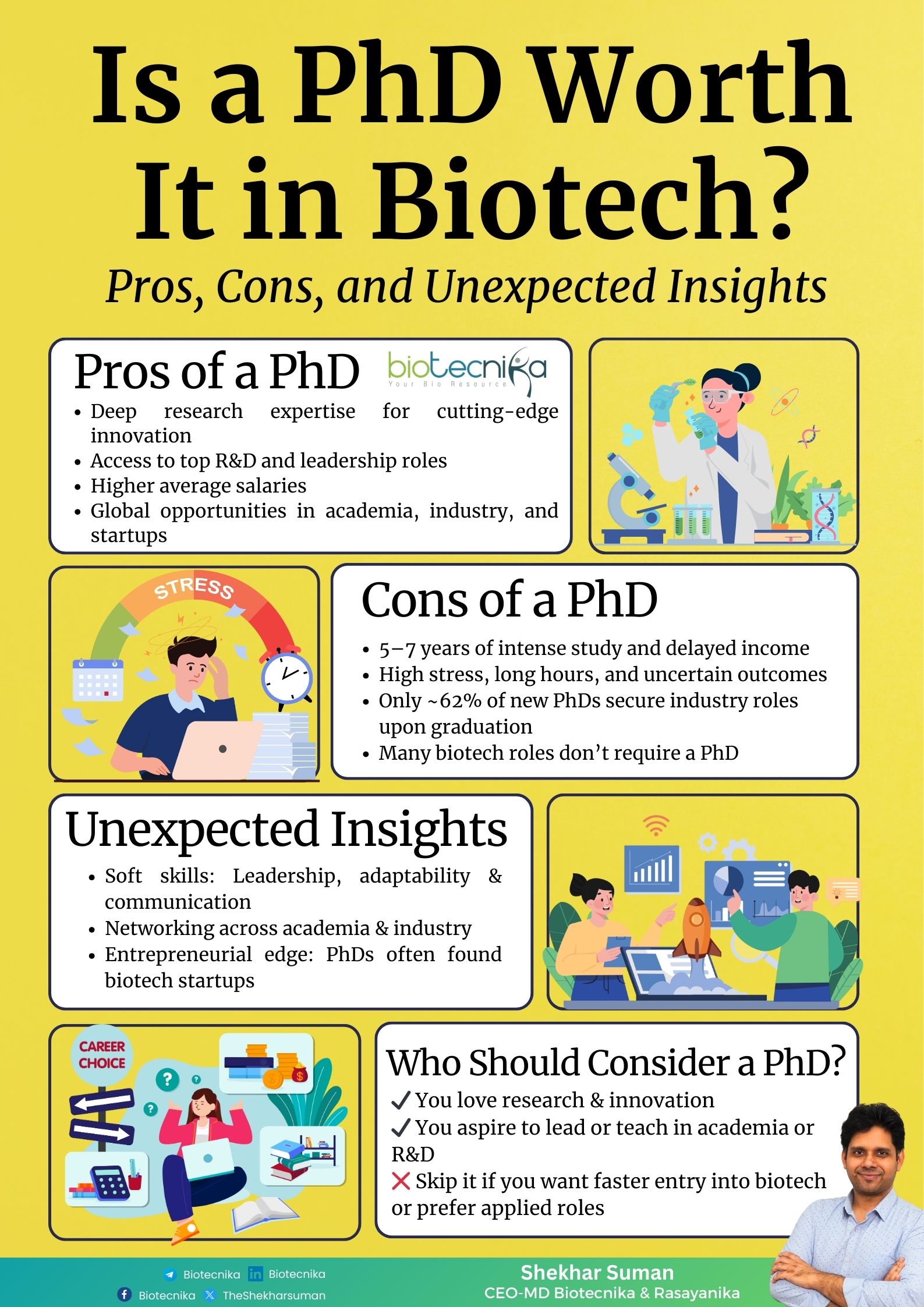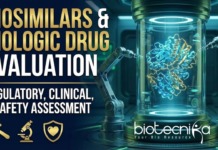Table of Contents
Is a PhD Worth It in Biotech?
It was past midnight; Isha was restless, and the thin glow of the laptop revealed two open tabs. One was from the admission committee congratulating her on her PhD admission, while the other was from the biotech company offering a job that does not require a PhD. As she pondered the question, "Is a PhD worth it in biotech?”, these opportunities kept her wide awake. She was not able to understand what she should do, whether to devote the next five to six years to chasing her doctorate or directly leap into industry.
Today, thousands of biotech graduates face the same dilemma: is a PhD worth it in biotech? Is a PhD still the golden ticket in biotech, or just another route to the same destination?
Biotechnology is revolutionizing the world today. With a $1.55 trillion market value by 2023, the industry offers endless opportunities. From gene editing and drug development to precision medicine, biotech is booming. But does earning a PhD guarantee success? Could it be an expensive detour for those looking to kickstart their careers?
We will explore the pros, cons, and unexpected insights of biotech PhDs. Whether you are a final-year student or an industry professional, this analysis will help you make a firm decision. So, let’s begin with the positive side of pursuing a PhD.
Why a Biotech PhD Pays Off?
Deep Research Specialization
A PhD equips the individual with the skills that will help them to design and execute a cutting-edge experiment. It offers rigorous training to survive in the biotech field. A doctoral student’s work on complex problems leads to groundbreaking innovations. The origin of mRNA vaccines and personalized therapies was in universities and research labs. With a PhD degree, you can climb the ladder of leadership. You can work as a principal investigator or R&D director. Their positions demand advanced research skills.
Career Advancement and Competitive Salaries
In the biotech industry, scientists with a PhD will have faster career growth and high-paying jobs. In the U.S., a research scientist earns an average salary of $99,000 per year. With management or director roles, they earn even higher. In India, a biotech PhD holder can expect a pay scale starting from ₹6 to ₹15 lakhs per annum. According to studies, PhD holders have higher pay and more job satisfaction than others.
Working with Cutting-Edge Resources
The program allows you to work in high-tech laboratories, access modern equipment, and use research facilities. During your PhD, you will collaborate with renowned researchers and experts, which will expose you to a much deeper level of science.
The Hidden Costs of a Biotech PhD
Time and Financial Investment
A PhD journey is a big commitment that demands nearly 5-7 years of your life. During this time, you will earn only a small stipend, which can be delayed. This will lead to financial stress. Many PhD students talk about the heavy workloads and stress they experience during this journey. According to a global survey, 76% of graduate students work for 40 hours a week. Due to this, 40% of them express their dissatisfaction with no work-life balance.
Uncertain Job Market Post-Graduation
Getting a job after a PhD is not guaranteed. In 2023, only 61.6% of new biomedical Ph. D.s were able to secure a job, whereas in 2022, it was 66.5% of Ph.D. students who got the job. According to a recent survey, 59% of professionals are thinking about switching to other industries. This is due to the increasing layoffs and decreasing job openings.
Not Always a Prerequisite
Remember that not all biotech jobs require a PhD. Regulatory affairs, quality assurance, and other research-related roles look for practical experience and skill sets. You don’t need a PhD degree to excel in the biotech industry. Many positions value experience, technical skills, and a strong understanding of the subject. You can succeed in the industry even with a bachelor’s or master’s degree.
Unexpected Insights: Beyond the Lab Bench
Is a PhD Worth It in Biotech?
Build Useful Skills for Any Career
The PhD program teaches you more than just science. It helps you build some of the most important skills, such as soft skills, apart from technical ones. By the end of this program, you will have better communication skills, teamwork, problem-solving ability, leadership qualities, and flexibility. Do not think that only technical skills matter. In this rapidly evolving biotech industry, these skills are your secret weapon. They will help you move beyond the basic lab work and become a valuable leader and team player.
Networking and Collaborative Opportunities
The program will often involve collaborating with the faculty, industry experts, and peers across institutions and countries. During your PhD journey, you must attend conferences and seminars, which will help you gain more opportunities. You must work on joint projects and mentorships that will expand your professional network. Connecting with the others will open the doors to new possibilities, grants, and collaborative ventures.
Entrepreneurial Ventures
The biotech industry offers endless startup opportunities. In 2024, biotech startups raised $5.6 billion in Series A funding, making up over half of all U.S. early-stage venture funds. Whereas, in India, with a strong government support and rising private investment, the sector is growing fast. The PhD holders, with research experience and deep knowledge, are all set to start their own biotech companies. They are well-equipped to turn their innovations into new ventures.
Diverse Career Pathways
Many have a preconceived notion that a PhD is limited to academia. But the reality is different. This advanced degree will open doors to many career pathways. Many PhD graduates, after completing their degree, work as scientific writers, medical science liaisons, and regulatory affairs experts. The job roles are financially rewarding. They offer an average salary of $192K and $126K for medical science liaisons and biotech sales professionals.
Real-World Impact of PhD-Driven Innovations
While a PhD equips you with theoretical depth, its true power lies in real-world impact. Many revolutionary biotech innovations have emerged directly from PhD research labs:
-
CRISPR-Cas9 Gene Editing: The technology transforming genetic engineering stemmed from PhD-led academic research. Today, CRISPR is used in agriculture, medicine, and diagnostics.
-
mRNA Vaccines: Years of foundational work by PhD researchers like Dr. Katalin Karikó made rapid COVID-19 vaccine development possible, showcasing how academic persistence leads to global solutions.
-
Artificial Organs and Bioprinting: Advances in tissue engineering are being led by PhD-trained bioengineers pushing the limits of regenerative medicine.
Such breakthroughs highlight that doctoral research isn’t just academic—it drives societal progress and can even redefine global health and sustainability.
Do You Really Need a PhD? Alternatives & Career Paths
You don’t need a PhD to build a successful biotech career. Here are high-value alternatives:
-
Master’s Degrees in Specialized Fields—Programs in molecular biology, bioinformatics, AI ML, Cancer biology, biostatistics, or biotechnology management can lead to careers in industry R&D, quality control, or regulatory affairs. These often take only two years.
-
Professional Certifications – Courses in areas like Good Laboratory Practice (GLP), regulatory compliance, or bioinformatics from accredited institutes or platforms like Coursera, Biotecnika or edX can provide job-ready skills.
-
Internships and Fellowships—Real-world lab experience during internships or industry-sponsored fellowships often outweighs theoretical knowledge in hiring decisions, especially for clinical research or QC roles. Biotecnika offers multiple industry-oriented research Project work opportunities under training and internship. Check them out.
-
Entrepreneurship – If you have an idea and industry insight, biotech incubators and accelerators such as Y Combinator Bio, IndieBio, or C-CAMP India provide mentorship and funding, and no PhD is required.
-
Tech-Centric Roles – With AI and data science revolutionizing biotech, skills in machine learning, bioinformatics, and computational biology are in high demand. Coding knowledge and data fluency can lead to roles like algorithm engineer, data scientist, or clinical analyst.
Is a PhD Worth It in Biotech? We hope we clarified most of your doubts via the above pointers. Choosing a PhD in biotechnology is a big decision that depends on your goals, finances, and career plans. A PhD can give you expert knowledge, chances to lead, and possibly higher pay. But it also takes many years and can be costly. For some people, it’s the right fit. For others, options like a master’s degree, industry training, or starting work right away might make more sense. In the end, the best path is the one that matches your own goals and priorities.






























Good
Kindly give information on current job postings for PhD holders in Biotechnology industry. At least this could save time on searching the jobs by the PhD candidates.